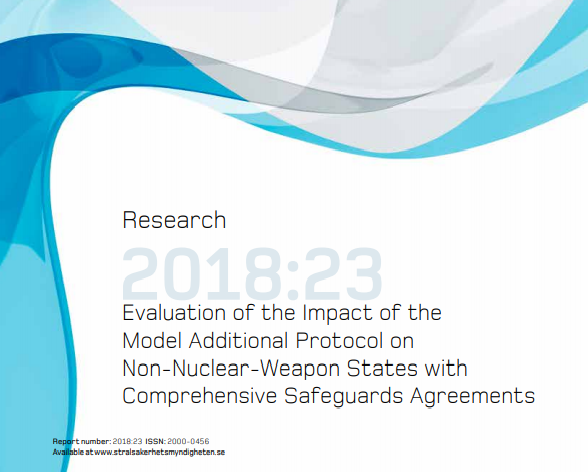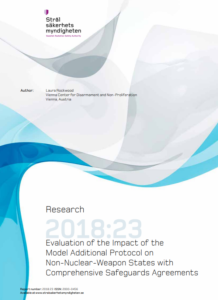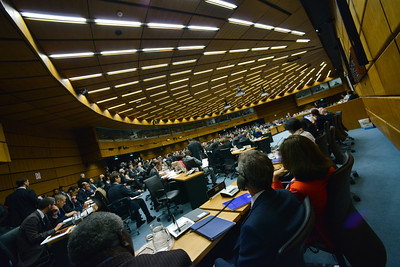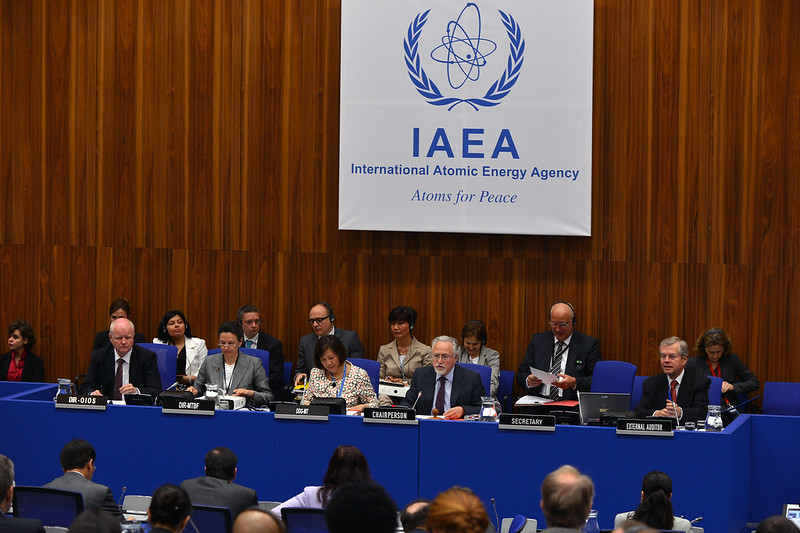
 VCDNP Executive Director Laura Rockwood has authored a new study for the Swedish Radiation Safety Authority (SSM), entitled "Evaluation of the Impact of the Model Additional Protocol on Non-Nuclear-Weapon States with Comprehensive Safeguards Agreements." The study describes States' experiences in implementing Additional Protocols (APs), analyses how APs impact safeguards implementation, raises awareness about the resources required to conclude an AP and shares lessons learned offered by the participating countries.
VCDNP Executive Director Laura Rockwood has authored a new study for the Swedish Radiation Safety Authority (SSM), entitled "Evaluation of the Impact of the Model Additional Protocol on Non-Nuclear-Weapon States with Comprehensive Safeguards Agreements." The study describes States' experiences in implementing Additional Protocols (APs), analyses how APs impact safeguards implementation, raises awareness about the resources required to conclude an AP and shares lessons learned offered by the participating countries.
The findings of the study are based on a survey of a target group of 20 States and EURATOM, each of which had concluded with the IAEA both a comprehensive safeguards agreement (CSA) and an AP, and some of which had also concluded small quantities protocols to their CSAs. The group included States selected from each geographic region, with a range of nuclear activities, from States with extensive nuclear fuel cycle activities to those with little or no nuclear activity.
The success of the study would not have been possible without the substantial contributions of VCDNP staff members Artem Lazarev and Mara Pfneisl, as well as former VCDNP intern David Munnelly.
A brief summary from the findings of the study is below.
"According to the project participants, the benefits of AP implementation outweighed the challenges. Implementation of the AP led to a reduction in the frequency and numbers of IAEA safeguards missions reported by almost all of the States and by EURATOM (although that frequency and number fluctuated depending on the nuclear activities of the States concerned).
The implementation of the AP also resulted in collateral benefits, such as better oversight of nuclear material and related activities, better export and import controls and improved cooperation between State entities. It also contributed to a strengthening of the legal and regulatory framework for safety, security, safeguards, and emergency preparedness, improved cooperation with the IAEA and increased confidence of the international community in the exclusively peaceful nature of their respective nuclear programmes. For its part, EURATOM noted that the information acquired through the AP “allows a wider knowledge of the nuclear programmes and, as such, enables a strategic planning of safeguards activities.” In terms of lessons learned, the most often cited by States, regardless of the category, was that working with the IAEA in a transparent, proactive and cooperative manner offered the maximum benefit to the State concerned. The participants also emphasized the importance of investing in increased awareness and training of the parties involved, as well as continuous follow-up and consultation with the IAEA, particularly at the beginning of the process."
Read the full text of the study here or read the abstract on SSM's website.


By continuing to use the site, you agree to the use of cookies. more information
The cookie settings on this website are set to "allow cookies" to give you the best browsing experience possible. If you continue to use this website without changing your cookie settings or you click "Accept" below then you are consenting to this.